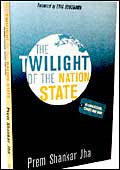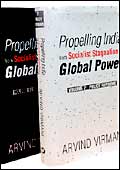 |
THE TWILIGHT OF THE
NATION STATE
By Prem Shankar Jha
Vistaar Publications
Pp: 373
Price: Rs 480 |
Is
the world really heading towards chaos? Prem Shankar Jha is quite
certain that it is. And he has also zeroed in on who's to blame:
the forces of globalisation that are fuelled by runaway capitalism,
which, in turn, is inextricably linked to the neocons in the White
House.
But this isn't just another book written
by a bleeding heart us basher. It is one of the few ground-breaking
analyses emanating from the non-western world and challenges many
of the ideological tenets that most critiques of globalisation
take as a given. Jha is always alive to the immense possibilities
that the forces of globalisation and capitalism can potentially
unleash. But he's also aware of the pitfalls. It is this balance
through most of the book that makes it such a compelling read.
However, at the risk of contradicting oneself, this reviewer must
add that there are passages that border on the hysterical and
read like an angst-ridden critique of us motives and actions.
The book's central premise is that capitalism
developed in four major stages. The end of each stage was marked
by unrest, war and chaos-each round more devastating and destructive
than the previous one. Over the last decade, the creeping collapse
of the Westphalian system, the gradual rollback of the welfare
state (even in the West), the weakening of the nation state and
the worldwide curbs on trade unions-the bedrocks on which all
civilised societies have been built over the last 400 years-have
taken the world from one crisis to another. The US, as the world's
only superpower, has attempted to fill this growing breach by
increasingly resorting to military power.
This has led the world ever nearer to the
precipice. Will it tip over the edge? The author thinks it may,
unless the forces of multilateralism can proffer persuasion as
a substitute for unilateral coercion that seems to be the order
of the day.
-Arnab Mitra
 |
PROPELLING INDIA
FROM SOCIAL STAGNATION TO GLOBAL POWER (VOLUME I & II)
By Arvind Virmani
Academic Foundation
Pp: 419 & 485
Price: Rs 795 & 895 |
Few
have attempted to lend a comprehensive quantitative underpinning
to the trends in the Indian economy since Independence. The author
does justice on this count, marrying economic theory with the
available empirical evidence, and with rigour. The results of
this labour are revealing. For instance, the trigger for the currency
shortage crisis in 1990-91 turns out to be quite different from
that conventionally agreed upon by economists, argues Virmani.
He also provides strong evidence to show that the reform clock
began ticking, albeit slowly, from the 80s and not beginning early
90s as a reaction to the currency crisis. Rather, the 90s witnessed
an accelerated pace of economic reforms. Virmani's comparative
analysis of the Indian and Chinese economies is indeed insightful
and succinct. His ability to provide a holistic view, incorporating
the behavior of institutional processes, is splendid and well
researched.
The book is full of the author's attempt
to capture comparative analyses on a scoreboard, and the Virmani
Index of Power, or VIP, is a high point of this exercise. The
index captures the economic and technological prowess of India,
China and the us, among others, and draws various inferences including
that of India becoming a global power in a few decades, provided
issues like governance are addressed.
While the first volume of the two-part book
interprets past events, the second one looks at the policy tasks
ahead. For instance, the extent of integration with global markets.
Virmani argues that the degree of integration in short-term money
markets is far from perfect. He also goes on to show that the
government effectively controls interest rates, notwithstanding
its stand to the contrary. Clearly, Virmani draws from his experience
in government as much as his training as an economist.
-Balaji Chandramouli
|






